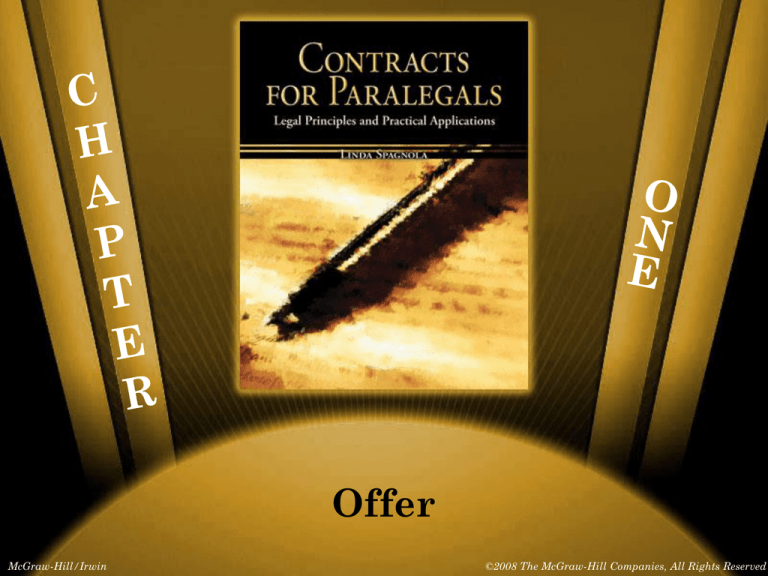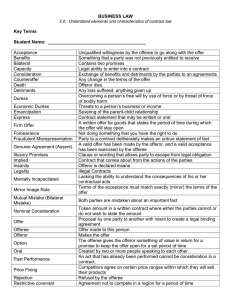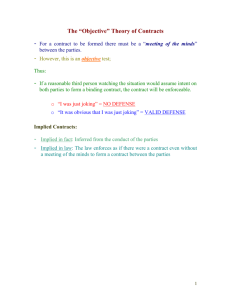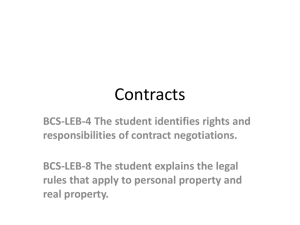
Offer
McGraw-Hill/Irwin
©2008 The McGraw-Hill Companies, All Rights Reserved
Objectives
Chapter Objectives:
– Use vocabulary regarding offers properly
– Identify the offer as either unilateral or bilateral
– Discuss whether all necessary terms are certain in
order to be considered a valid offer
– Determine whether the offer has been effectively
communicated to the intended offeree
– Determine the method of creation of the offer
– Evaluate when an offer can be or has been
terminated
– Identify irrevocable offers
1-2
Offer
This chapter will explore:
• Type - unilateral versus bilateral
• Who – the parties involved
• What – the subject matter of the offer
• When – are there time limits?
• How – methods of creation and termination
1-3
Definitions
• Offer – A promise made by the offeror to do (or
not to do) something provided that the offeree,
by accepting, promises or does something in
exchange
• Offeror – The person making the offer to
another party
• Offeree – The person to whom the offer is
made
1-4
Mutual Assent
• Mutuality of Contract
– A mutual agreement to be bound by the
terms of the offer
– A party must reasonably intend to
make the offer binding
1-5
Mutual Assent
• Objectively Reasonable
– The standard of behavior that the majority of
persons would agree with or how most persons
in a community generally act
1-6
Mutual Assent
• Bilateral Contracts are a contract in
which the parties exchange a promise
for a promise
• Unilateral Contracts are in which the
parties exchange a promise for a act
1-7
Breach of Contract
• A breach of contract is a violation of an
obligation under a bilateral contract for
which a party may pursue legal
remedies
1-8
Certainty of Terms
Rule of Thumb:
The more certain the terms, the
more likely it is to be a valid
offer
1-9
Certainty of Terms
Four elements that must be certain:
1. Parties (who)
– The persons involved in making the
agreement
1-10
Certainty of Terms
Four elements that must be certain:
2. Price (how much)
– Monetary value ascribed by the
parties to the exchange involved in
the contract
– Must be specified in the offer to have
a “meeting of the minds” and be
legally binding
1-11
Certainty of Terms
Four elements that must be certain:
3. Subject Matter (what)
− The bargained-for exchange that forms the
basis for the contract
− Quality, quantity and content must be
reasonably specified to ascertain what is
1-12
Certainty of Terms
Four elements that must be certain:
4. Time for Performance (when)
– Determines when the parties must fulfill
their obligations made in the contract
– Time is of the Essence clause
• Used when the performance of the
contract must occur on or before the
specified date
1-13
Certainty of Terms
The creation of a contract is entirely
up to the parties; within the limit of
contract law, a court cannot create
a meeting of the minds on the
terms. If the terms are uncertain,
there is no contract because there is
no valid offer.
1-14
Communication to Offeree
•
To have Mutual Assent:
– The offeree must have knowledge of the
offer
– The communication must include all the
certain terms
– The parties must understand how to
accept the offer (bilateral or unilateral
contract)
1-15
Method of Creation
•
Express Contract has been expressed in
words, either written or oral
•
Implied Contract is created by actions of
the parties – the action of the parties
indicate the existence of the contract
1-16
Termination of the Contract
• There are several methods to
terminate a contract:
1.
2.
3.
4.
5.
6.
Lapse of time
Revocation of the offer by offeror
Rejection/counteroffer by the offerer
Incapacity or death of either party
Destruction or loss of the subject matter
Supervening illegality
1-17
Termination of the Contract
Revocation can be either a direct
statement by the offeror being
unwilling to enter into the contract or
indirect communication by
performing acts known to the offeree
that are inconsistent with the offer
1-18
Irrevocable Offers
Irrevocable offers cannot be
terminated by the offeror during
a certain time period
1-19
Irrevocable Offers
• Option Contracts:
– Offeror agrees to keep offer open for
specified time period during which
there is no power to revoke the offer
– Supported by separate consideration
1-20
Irrevocable Offers
• Firm Offers:
– Governed by Uniform Commercial Code
– An express promise that an offer will
not be revoked for a certain time period
– Not supported by separate consideration
1-21
Summary
• The offer, created between the offeror
and the offeree may be bilateral or
unilateral
• Offer may be created by express words,
or implied by action of the parties
1-22
Summary
• The offer must be certain in its terms.
The offeree must know what he is
agreeing to:
– Parties
– Price
– Subject
– Time for performance
1-23
Summary
• The offer may be terminated in a number of
ways
1. Lapse of time
2. Revocation of the offer by offeror
3. Rejection/counteroffer by the offerer
4. Incapacity or death of either party
5. Destruction or loss of the subject matter
6. Supervening illegality
1-24








